Preparing for the Decisive Struggle
F. Roger Devlin, American Renaissance, September 13, 2019
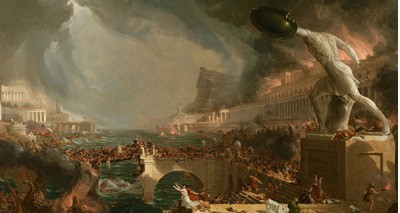
Guillaume Faye, Ethnic Apocalypse: The Coming European Civil War, Arktos Media Ltd., 2109, $31. 50 hardcover, $19.50 paper
This book, Guillaume Faye’s last gift to us, was finished as he was dying of cancer during the winter of 2018-19. With nothing left to lose, his language became even more forceful than usual. Faye urges his fellow Frenchmen to prepare for the physical struggle he had, by the end of his life, come to see as almost impossible to avoid. The book’s original title was Racial Civil War. His editors at Arktos Media prudently softened it, realizing it would only attract the attention of censors.
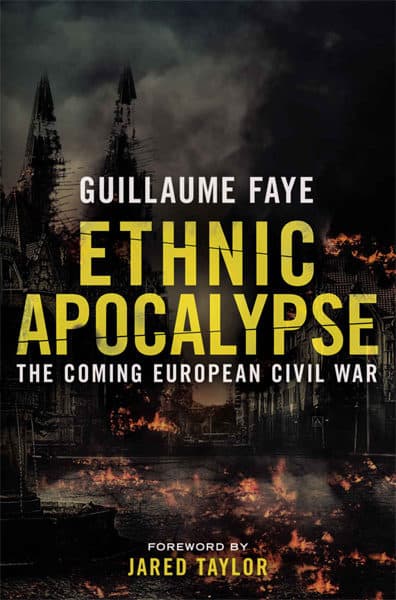
Guillaume Faye never wanted race war, but he also understood there could be worse outcomes: The West could give up without a fight, choosing submission (the literal meaning of Islam) in the vain hope of preserving life and some level of comfort. Clearly, many among the French and European elite are already prepared to choose that option. If such an inglorious civilizational death is to be avoided, it will probably be necessary for ordinary people to go over the heads of their “leaders” and seize their own destiny.
Faye starts from the principle that:
ethnic homogeneity is the condition for civil peace and prosperity. As rightly noted by Aristotle, the peaceful and economically viable coexistence of ethnically different populations on a single territory is generally impossible. It leads to incessant conflicts, followed by a civil war in which the invaders attempt to replace the natives.
But postwar French governments succumbed to a utopian vision in which radically different races and cultures could live in harmony. They have been forcing a foreign invasion on an unwilling nation.
Broadly speaking, the two main immigrant groups have been Muslims from the Maghreb region of North Africa and blacks from south of the Sahara (many of them also Muslim). Despite enjoying preferences over the native French, a disproportionate number fail to find regular jobs. They subsist in dismal state-subsidized housing projects on the periphery of major cities; their children do badly in school and often commit petty and not-so-petty crime.
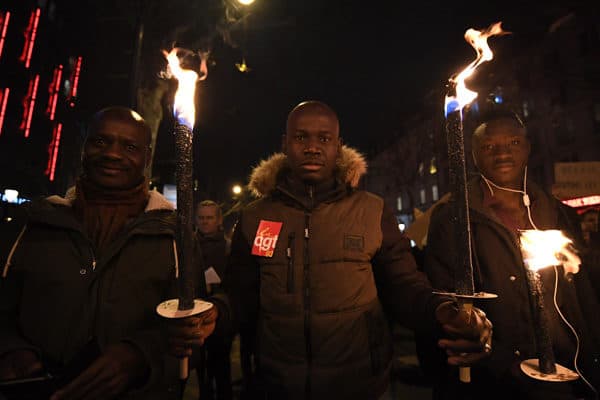
On the occasion of the International Migrants Day, a demonstration against racism and fascism was held in Paris. (Credit Image: © Julien Mattia/Le Pictorium Agency via ZUMA Press)
Even immigrants who were not especially religious tend over time to take up Islam as a badge of ethnic identity. In Mr. Faye’s words, they see it as “the natural religion of non-whites. Non-Muslims such as black Africans or mixed-race individuals often convert not for religious reasons, but for racial ones.” Thus do they express their contempt for the native population, as soldiers in Islam’s 1,400-year war against the West.
Faye quotes the lyrics of one black rap “artist:”
I enter nurseries and kill white babies, seize them quickly and hang their parents,
Quarter them to pass the time,
Whip them hard and do so earnestly.
Let it all reek of death, let them piss blood,
Let these foul fruits provide us with a fascinating, pallid and entertaining spectacle. . . .
Chorus: Hang them, hang them, hang the Whites!
Elite collaborators
Many French politicians continue to promote policies that have manifestly failed. Longtime fixture on the French left, Jacques Attali, has said:
It is in our interest to massively develop this neighboring continent [Africa]; to organize the coming of migrants to Europe; to welcome and integrate millions of people into our cultures upon their arrival from this cradle of humanity . . . . [Migrants] will turn Europe into the world’s leading power.
Can Mr. Attali really believe his own words?
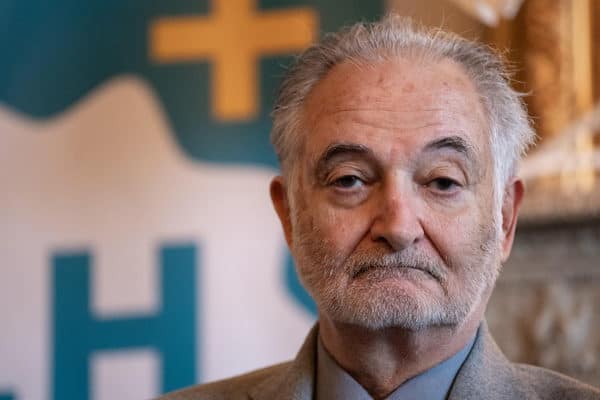
Jacques Attali (Credit Image: © Julien Mattia/Le Pictorium Agency via ZUMA Press)
An increasingly common pretense of French elites is that postwar Muslim immigration is not really new. In this vein, former Prime Minster Manuel Valls said: “Islam is an inseparable part of ourselves and our culture, and hence of our roots.” Another fashionable argument is that the secularism of the French state “stigmatizes” Muslims (but never native Catholics, apparently). Meanwhile, the more old-fashioned Marxist Left claims that Muslim criminals and terrorists are the result of “globalized capitalism.”
Many have been surprised by the Left’s support for Islam. Mr. Faye thinks this is like the fascination with violence that once attracted them to communism, and which they have been missing ever since the collapse of the Soviet Union. He also explicitly compares the craven submission of today’s elites with collaboration during the German occupation of 1940–44:
Whatever one may think of the fascist undertakings of the 1930s, the fact remains that the phases that lead some people to embrace collaborationism are still the same as in the past. Both collaborationist groups, whether today or under the Occupation, stem mainly from the Left, including the communist milieu. As for members of the resistance, they mostly come from the Right. And yet for the past decades, the media have been trying to make us believe the very opposite.
Today’s collaborationists pose as champions of “democracy.” The great enemy of democracy, as they tell it, is populism, which President Emmanuel Macron likens to leprosy. Yet, as Faye points out, democracy comes from demos and populism from populus, both of which mean “the people.” The elites pretend democracy consists in “violating the will of one’s necessarily ignorant and misguided people” whereas populism is an expression of popular will with which elites disagree.
Faye writes that the principle goal of French rulers is:
to preserve [their] own tranquility as well as [their] agents’ sinecures. They are not concerned with protecting their compatriots and their children any more than they are with safeguarding the memory of their ancestors. They lecture their fellow citizens about anti-racism, tolerance and living together [while] they themselves live, work and move about in completely unspoiled areas protected against any and all allogenic influences. The only colored people they encounter on a daily basis are their own housekeepers. To them, low-income indigenous Frenchmen are anything but blood brothers. It does not matter to them whether the French citizen “below” is black or white, or whether he speaks Polish or Arabic.
As someone has noted, they see their subjects as a kind of “undifferentiated human matter.” But Faye is confident that “this oligarchy will eventually be wiped out — either by its fellow citizens or by its adored invader-protégés.” He understands its attempts at appeasement are futile: “The more the [non-white immigrants] are aided, the more they hate us and complain . . . . The aggressor is aroused by the weakness of those he attacks.”
One important component of France’s xenophilic elite is the Catholic hierarchy, oblivious to Islam’s war against the church. Mr. Faye writes that “lobbies linked to the Catholic Church were the first” to promote mass immigration. Appeals to Christian charity are unconvincing: “To preach love in all circumstances and forgiveness of the most atrocious crimes is the best excuse for cowards to justify their own inaction.” Genuine Christian charity is for the sincerely repentant.
Pope Francis has acknowledged that “one can indeed speak of an Arab invasion” of Europe, but he believes it is a good thing: “The invasions Europe has experienced have truly been numerous! And it has always found the ability to surpass itself, to move forward and thus find itself enhanced by cultural exchange.” Faye notes that what Pope Francis calls “cultural exchange” was bloody clashes followed by centuries of despotism in Spain and the Balkans.
Mr. Faye notes that a few on the Left understand the threat of Islam:
We sincerely hope our dear old opponents, who once idolized Trotsky, Lenin or Marx, will fight alongside us when the time is right. For we shall require all of our brothers and sisters if we are to emerge victorious from the coming war.
Islam’s home-grown critics
Just as there are white collaborators, there are also men of Muslim heritage who understand that the triumph of radical Islam would be a disaster for the entire world. They have become some of the most effective critics of Islam in the French-speaking world. Algerian writer and journalist Kamel Daoud, whose first novel won France’s prestigious Prix Goncourt, wrote that nobody should be surprised by the attacks on women in Cologne, Germany:
Sex represents the greatest misery in the world of Allah, so much so that it has given birth to the porno-Islam that preachers make use of in their speech aimed at recruiting the faithful: a description of a paradise that is more like a brothel than a reward for pious people; a fantasy of virgins for the suicide bomber.
Mr. Daoud has been dragged through the mud by the leftist intelligentsia and accused of apostasy by Islamists.
Another Algerian writer, Boualam Sansal, has published a dystopian novel describing “a world dominated by radical Islamism.” He predicts a Syrian-style civil war in Algeria and expects it will be exported: “One can estimate that in thirty years’ time, Islamism will rule the entire Muslim world;” then “it will set out to conquer Western civilization.”
It is impossible not to admire these men. As Mr. Faye notes: “When one is an Arab, criticizing Islam is synonymous with drawing a target on one’s own forehead.” However, the “moderate” Islam most of them recommend remains:
a utopian one that remains purely conceptual, a pipe dream only advocated by a minority and which does not correspond in any way to the historical and sociological reality of Arab peoples. [The reformers’ task] is akin to striving to institute an agnostic form of Christianity, monotheistic Hinduism or liberal communism.
The enemy
At the heart of the enemy camp, in Mr. Faye’s view, stands Salafism — a tendency within Islam not fully embodied in any single organization.
Salafists hold that the best, most authentic form of Islam was in the time of Mohamad and his first followers. Therefore, the best way to live a Muslim life today is through a literal reading of the Koran and direct imitation of Mohamad’s own often brutal acts. Salafists are not “extremists.” They do not exaggerate early Muslim practice — they don’t have to. Faye notes that primitive Islam supports systematic killing:
Islam was founded by Bedouin tribes of looters and warriors. Muhammad himself was an assiduous practitioner of violence. In Islam, crime and delinquency are not illegal as long as they do not target members of the umma (i.e., the community of Muslim believers). Steeped in Christian culture, we often think that religion is substantially synonymous with non-violence and respect for others. Such a view is absent from the Muslim tradition and beyond its understanding.
Salafism encourages the withdrawal of all Muslims into their own communities to avoid all contact with “infidels.” Schools are an important part of their program:
Every child that has been educated by these Salafist brutes to espouse hatred of the infidels could, at any moment, be incorporated into the recruiting sphere of their terrorist killing force. If one spends one’s days memorizing the most violent verses of the Qur’an and hadiths, watching sanguinary videos, and visiting various radical social networks run by Salafists, which is the case of tens of thousands of young Muslim people, one obviously ends up being very tempted to take action. Horror and “sacred” criminality become one’s only horizons.
An estimated 50,000 Muslims in France identify with Salafism. Though they are a minority, they are as Mao described guerillas: They “swim among the people as a fish swims in the sea.”
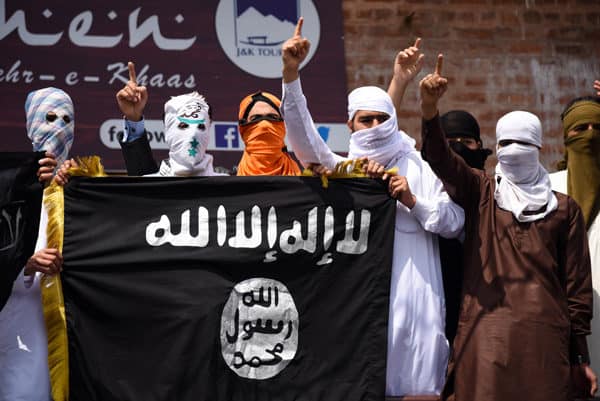
(Credit Image: © Idrees Abbas/SOPA Images via ZUMA Wire)
Mr. Faye is aware that many hostile black African immigrants are not (yet) Muslim. He says they do not integrate into French society because “they do not have the intellectual capacity to do so.” They are a threat even without Islam.
Gathering clouds
In recent years, the pace of Islamic terror has increased. In July 2014, a truck attack killed 86 in Nice; copycat attacks followed in Berlin and Stockholm. In January 2015, two gunmen stormed the Paris offices of the satirical magazine Charlie Hebdo, killing 12. The following November, Muslims killed 131 people in a series of attacks that included the Bataclan concert venue in Paris. In 2016, an elderly priest was beheaded to shouts of “Allahu Akbar!” as he celebrated mass.
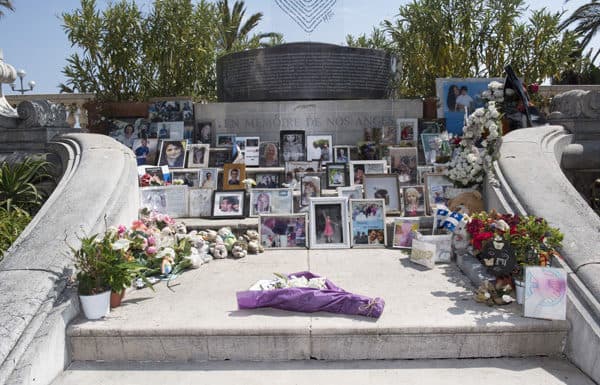
May 7, 2018 – Nice, France – Memorial for the Bastille Day terror attack in Nice, France. (Credit Image: © Arthur Edwards/PA Wire via ZUMA Press)
But these are only the most spectacular cases. It has become a regular sport to set fire to a building, lure police and firefighters, and ambush the responders with stones and Molotov cocktails. Immigrants have set patrol cars on fire with officers inside.
Immigrant men and boys constantly harass French women on the streets; some women barricade themselves in their homes. In 2017, residents of Paris’s notorious 18th arrondissement circulated a petition of protest. Pathetically, they added an explicit disavowal of “racism,” which made clear who was responsible for the problem. It did not matter; they were denounced as racist bigots.
One may well wonder at French men who have passively allowed this. As Mr. Faye writes: “in all cultures, the normal, vital reflex is to protect one’s women against any and all sexual assaults committed by foreigners.” Yet he also acknowledges that “should squads of young Frenchmen ever patrol these districts to protect women in the streets and neutralize the aggressors . . . the police would be ordered to arrest them.”
The native French of both sexes are cowed by increasingly harsh and purposely vague laws against “incitement to racial hatred” that in practice apply almost exclusively to whites. Until recently, this appears to have worked; the French grumble to trusted friends but do nothing. As Faye points out, the only reason civil war has not broken out is that the natives have not yet begun to fight back: “So far, the clashes have been limited to confrontations between Maghrebian and black youths on one side and our public security forces on the other” — except for one case noted below.
French authorities are aware of the possibility of native resistance and have sought to head it off by monitoring “right wing extremism” more than fighting immigrant crime and Islamic terrorism. In October 2017, a small group of Frenchmen were arrested for planning to spray mosques with graffiti or leave pork at the door. Faye comments: “Rather unintelligent symbolism, of course, yet devoid of any homicidal, criminal or heinous intention, and not a source of danger in any way.” They were denounced as terrorists comparable to Allah’s warriors.
Less than a year later:
[T]en men and women were arrested and accused of criminal and terrorist conspiracy. It appears that these people were planning attacks on both mosques and veiled women in retaliation for the killings perpetrated by Islamists over the past three years. The arrested individuals were, for the most part, family men with no criminal history.
It may be that the government’s zeal to stifle native resistance is only encouraging it. How many more times are they going to catch such groups before they act? Faye writes, “If a French attack against Muslims did take place and were crowned with success, it would have but one result, I believe: It would unleash a civil war upon us once and for all.”
More recently, the harshness of the government’s response to the native French yellow-vest protests has made clear which group the government considers more dangerous. But the authorities have a weakness: They are dependent on ordinary, non-elite policemen and gendarmes for their own protection — and it is non-white immigrants — not “the extreme right” — who hate and harass these men. Several thousand police officers are now injured on duty every year, and the numbers are rising. Resignation rates are soaring, and there have been suicides. The head of a government inquiry into the state of the police remarked:
We are truly on the verge of collapse. Our police officers and gendarmes lack adequate means to do their job. They are exposed to ever-increasing danger, the everyday violence of the [immigrant] housing estates and systematic ambushes. They are becoming more and more convinced that the physical risks they take are pointless.
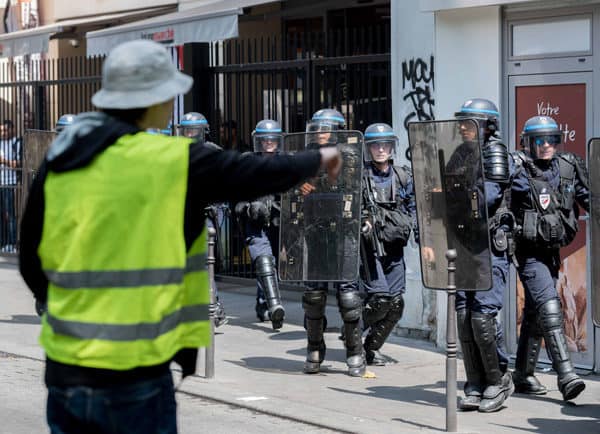
Tensions between protesters and police Yellow Vest protests in Paris on July 13, 2019. (Credit Image: © Estelle Ruiz/NurPhoto via ZUMA Press)
One source of anger and demoralization is the courts, which hands down extremely light sentences. Last year, France’s highest court prohibited prosecution of anyone helping immigrants settle illegally in France.
Photographs of police officers, sometimes with home addresses, are shared on social networks popular with immigrants, sometimes with direct appeals to murder. Officers have had their homes invaded and been punished for using force to defend themselves.
The case of Aboubakar Fofana is typical — and like countless incidents in the United States. in July 2018, this repeat offender was stopped at a police checkpoint in Nantes. He tried to drive off at the risk of ploughing into people nearby, including children. A quick-thinking officer shot him dead. The officer was then arrested. This was followed by five days of riots and arson by immigrants to whom Fofana was a hero.
The coming war
Guillaume Faye is not alone in seeing such events as a prelude to war. Gen. Pierre de Villiers, until recently Chief of Staff of the Armed Forces, declared that France has “entered a different age” where peace could “no longer to be taken for granted.” Mr. Faye believes this statement led to his forced resignation. Longtime left-wing politician Jean-Pierre Chevènement, a former Minister of the Interior, also “set aside ideological prudence” long enough to acknowledge that “we are now under threat of war.”
But how would racial civil war develop? The first step would be direct resistance by natives. So far, there has been just one case — in Corsica, in December, 2015. A group of young Maghrebians started fires in a housing project near Ajaccio. They screamed “dirty Corsicans” as they ambushed and severely wounded firefighters. The next day, hundreds of Corsicans arrived, chanting “Arabs get out!” They smashed a halal restaurant, ransacked a prayer room and burned many Korans. Mr. Faye comments:
Such an action-reaction scenario embodies one of the main sociological criteria for triggering civil wars, and was the very first of its kind in France. The event shall undoubtedly be a historical milestone. When a part of the population feels abandoned by the state and proceeds to take on the latter’s role, rejecting its law enforcement monopoly, taking justice into its own hands and ensuring its own defense, the state finds itself deprived of its peace-making role and the disorder of civile bellum has been unleashed.
In the not-too-distant future, some new criminal or terrorist act, not necessarily a large one, could be one too many. It could prompt Frenchmen to bypass politics and the state that they know will not protect them, and fight the invaders. Two things would then happen: economic collapse would make life much more difficult, and opinions would shift drastically and quickly. History would accelerate:
Whenever a serious crisis erupts, bringing with it a risk of death and systemic collapse, as would inevitably be the case with an interethnic civil war entailing a high level of violence, mentalities topple and opinions undergo radical change, even among the authorities themselves. One then witnesses an astonishing metamorphosis or perhaps even a complete reversal in people’s behavior and value judgments.
At this point, much would depend on the army, the national gendarmerie, and local police. So far, police have been ambiguous. They executed the authorities’ harsh response to the native yellow-vest protests, arousing popular anger. And yet there are also signs the men in uniform are deeply dissatisfied with their superiors. On the night of October 17, 2016:
hundreds of overexcited police officers, many of them on duty, spontaneously protested on the Champs-Elysees; this occurred in the vicinity of the French Ministry of the Interior, through which a wind of panic began to blow.
The movement quickly spread to other cities. The head of the police force was booed when he tried to call his men to order. Disgusted officers know their superiors despise them but depend on them.
Mr. Faye believes that when war breaks out and authority collapses, the gendarmes are perfectly capable of “embracing an attitude of insubordination and joining in an improvised and dissident manner, the ranks of a potential popular resistance.” This would make all the difference for the outcome.
The immigrants themselves “are, of course, very undisciplined, imprudent, and characterized by obvious tactical mediocrity,” and “physical courage in face-to-face confrontation is not their strong point.” Mr. Faye warns that they might well target white children. “Still, one can assuredly say that no matter how many of them there are, these troops of aggressors can definitely be defeated by more intelligent minorities, i.e., by us.”
Mr. Faye’s describes the civil war he believes approaching within the next 10 or 15 years:
When violence begins, it is likely to trigger an uncontrollable chain of events: The indigenous population could, like the police, switch to an attitude of defensive counter-violence that would lift many taboos. In a brutal, murderous and racial civil war, [men] take action in ways that would once have horrified them. [Such a war] will involve violence, as well as terrible tragedy and injustice. Making very quick decisions will turn out to be necessary. We must accept the fact that some deaths, even within the enemy camp, will neither be just nor pleasant to cause. An indigenous person must, however, choose other natives over all foreigners.
A racial civil war is not as imminent in the United States as in France, but it is not impossible. Like Faye, American Renaissance has devoted years to calling for a peaceful and realistic political solution to multi-racialism. This is because race war would be uncontrollable, unjust, and horrific. But should a physical struggle be forced on us, we must remember two things: 1) It is still better than surrendering our lives and civilization without a fight; and 2) the primary responsibility for the catastrophe will lie not with those who tried to warn against it, nor even with the non-whites arrayed against us, but with those of our own people who for decades had the power to prevent catastrophe but didn’t.
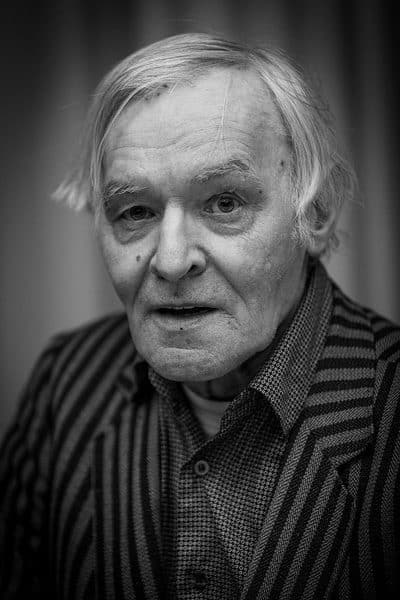
Guillaume Faye















